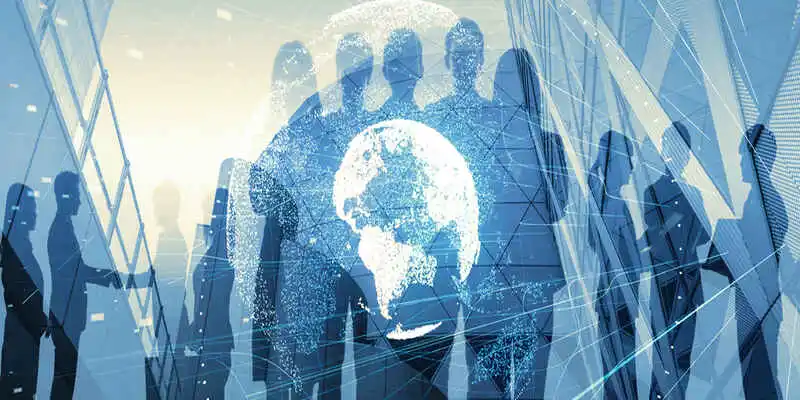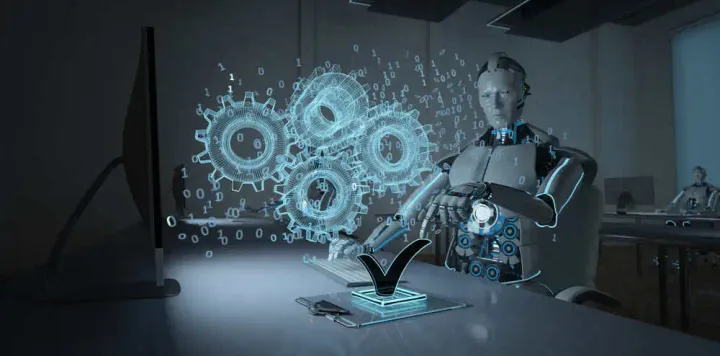Should AI Be Democratized?
AI is considered a “general-purpose technology” due to its pervasive role in various industries. Many researchers argue that AI should be employed just in highly-impact domains, while others advocate the consensus to democratize AI so that the benefits are not restricted to a small group of people.

In the modern era, technology is undeniably the most influential aspect making almost each of us a potential stakeholder, and the future of technology lies in the notion of intelligence.
Artificial Intelligence – the next digital frontier
Artificial Intelligence is widely regarded as the upcoming digital frontier and is intervening in all fields of global culture and society. AI is a rapidly emerging industry with extensive predictions of dramatically changing the economic and labor background worldwide. In the last few decades, we have observed tremendous achievements and advancements in the domain of Artificial Intelligence. By 2021-2025, the worldwide AI market is projected to grow by $76.44 billion, progressing at 21% CAGR. AI is now considered a revolutionary technology and a step forward to the future with its ability to change our society. Today, many tech startups and tech giants employ some sort of artificial intelligence. For instance, machine learning is used for forecasting, natural language processing is used to improve their interaction with customers while complicated deep learning algorithms are used to spot anomalies in their processes.
Challenges to implementing AI solutions
The world’s most influential organizations like Google, Microsoft, Amazon, and Facebook, etc. own a huge amount of data and have mastered the skill of applying AI to it. However, there are only a few companies that are using AI in their core business. A study by MMC Ventures revealed that in Europe, out of 2830 startups analyzed, the percentage of start-ups using AI for value proposition was just 60%.And if established companies were also included along with start-ups, this percentage would have decreased even more. It seems surprising, but it’s true. The reason behind this is that to implement AI solutions, a wide range of complex skills is a prerequisite. These skills include coding, data analysis, and statistics along with domain-specific knowledge. In addition, the availability of qualified people for its installation also lacks, and those who are available are quite expensive to hire. Last but not least, huge data infrastructures are required to train AI models that demand a huge initial investment. So many companies feel reluctant to make huge investments despite the outcome the technology brings as Yoshua Bengio, an AI pioneer and Turing Award recipient stated that in the field of AI, the expertise and the data are restricted in the hands of very few companies.
AI Democratization and why we need it?
AI is considered a “general-purpose technology” on account of its pervasive role across various industries. However, many researchers argue that this general-purpose technology is being employed just in highly consequential domains including education, medical, and criminal law. They advocate for inclusive AI and claim that there is a growing consensus to democratize AI so that the benefits of this emerging technology are not restricted to a small group of people.
Riedl in 2020 defined democratizing AI as making the creation of AI systems possible for everyone. For an enterprise, the democratization of AI means delivering AI to a huge number of audiences. AI teams play a vital role in delivering a stable solution with a quick response. AI democratization is a megatrend these days that is an indication of high-scale AI applications looming in near future. But the question is why we need to democratize AI?
According to the researchers, there is a strong need to make AI accessible to everyone to address the challenges to AI as mentioned above. Besides, AI also needs to be democratized based on the following ground realities:
- Lack of AI professionals – because of the inaccessibility of AI to everyone and everywhere, there is a lack of AI professionals worldwide. The start-ups that have been established in recent years in the era of the AI boom are continually fussing about the lack of experts in the AI field. These companies perceive this lack of expertise as a barrier to further innovations. A study compiled by the research institute of Tencent revealed that there were almost 300,000 AI professionals worldwide in 2018but according to them, millions more were required.
- Huge War to find AI talent – as AI is permeating through every domain of the world; there is a huge war to find AI talent. For instance, Silicon Valley giants are spending huge money to lure the most excellent AI engineers to work for them. In addition, these AI experts are offered huge salaries based on their skills. However, researchers suggest that instead of increasing the salaries to millions and fighting to find the best AI professionals from the same small pool of talent, AI training must be made accessible to as many people as possible. Educating people in the most common AI sub-disciplines like Natural Language Processing, Machine Learning, and Deep Learning will increase access to AI talent.
- Everyone has the right to get benefit from modern technology –the world is swiftly moving into a new era of advanced technology where AI will transform nearly every aspect of human life. However, people residing in the most remote corner of the world have hardly any access to the modern growing technology. They have equal rights to learn and benefit from emerging technologies. So if we urge everyone to get benefits from AI developments instead of just a few developed countries, we must put efforts to make the accessibility of AI to everyone across the globe. Therefore, there is a great need to democratize AI.
- To avoid AI Technocracy – to date, most of the AI developments are carried out by a handful of technology mega-corporations including Facebook, Google, and IBM, etc. These tech giants have infinite resources and create modern labs for AI research. They open their doors to the world’s best scientists leading to great advancements. While many enterprises are not tech-savvy and lack resources to build their own AI models so they depend on cloud technologies to fill this gap. For such companies, AI often feels overwhelming, complicated, and quite expensive particularly when data science is involved. As a result, tech giants turn out way ahead of the curve while other enterprises can hardly get to them or even get benefit from AI. Shen in 2017 reported that out of over 7 billion world’s population, just around 10,000 people from almost seven countries were writing the code for all of AI. By resting in the hands of just a few tech giants, the trajectory of AI applications seems to get significantly compromised. The datasets used to develop such AIs are also biased and not generalized to the masses. This scenario results in “Technocracy” where the future of the most budding technology in human history resides in the control of a small biased minority.
- Pandemic Covid-19 effects – last but not least, the pandemic Covid-19 has undeniably changed the present and future of almost every organization. Enterprises are now undergoing business transformation by reshaping their HR, marketing, and sales strategies to survive and thrive in the post-pandemic environment. Now the companies need to engage more digitally with customers and employees, marketing and selling digitally, and increase automation. So the enterprises are now trying to promptly deploy AI solutions across their business processes. Therefore, the democratization of AI is the need of time so that enterprises, as well as the consumers, get significant outcomes across the spectrum.
Benefits of AI Democratization
The dissemination of AI is valuable in many respects. Some of the major benefits are mentioned below:
- Trimming down the entry barriers – AI democratization trims down the entry barriers for individuals and organizations. Anyone can leverage publicly accessible algorithms and data and easily start experimenting to build AI models on cloud infrastructure. The more the accessibility of AI, the more organizations and users can benefit from it.
- Overall upgrading/improvement of business – AI democratization makes a strong connection between the business and technology by bringing them even closer to each other. Most of the people believe that AI is all about technology, but AI democratization is more about business outcomes.
- Societal change – with the awareness and increased usage of AI, global issues like climate change as well as the healthcare and law and force standards will be improved.
- Increased Automation – as per the prediction of Gartner, with AI democratization, most of the tools will be automated, presenting a new level of self-service. Hence automation will free up the potential of any company.
Prerequisites to Democratize AI
- Data democratization – Data is considered the new oil. The more the data, the more effectively one can understand and perform. Not only the quantity but the quality of the data also matters because the results are always as good as the data. Unfortunately, this data is kept private by the enterprises as it is the most important asset and often holds a considerable edge over the competition. Today, in our digital life when we have a look at the world’s most influential companies like Google, Facebook, Microsoft, and Amazon, etc, they are somehow similar in a way that they all own a huge amount of datasets and have the expertise to apply AI on these datasets. These IT giants have monopolizing presence with Google having 88% of the market share in advertising search, while Amazon with 74% of the e-book market. These tech giants keep their data private. This seems strategically sound but completely in contrast with the idea of Democratizing AI. Therefore, to democratize AI, first of all, data must be democratized. There is also a strong need to teach everyone from basic to higher education about the three data fundamentals i.e., data preservation, data quality assurance, and data organization. Limited and poor data quality results in the creation of unstable and misleading AI models. Similarly, poorly organized data makes the process of automation and building AI models more time-consuming and expensive. Training courses for organizations about how to value and deal with the data properly are viable short-cuts, whereas educating the rest of the population might take several decades. To democratize AI, data must be democratized first as the best results are attained only if someone has gigantic amounts of quality data and is free to use it.
- User-friendly Interfaces – In the past, the number of people who could operate computers was not very large. But at present, even toddlers can be seen using iPods. This has all been made possible because of the development of user-friendly interfaces over the years. While accomplishing an analytics project, a data scientist relies mainly on coding skills that could be intimidating at first so the less tech-savvy population can hardly understand and learn these coding skills. Therefore, to democratize AI, simple user-friendly interfaces are required to enable everyone to interact with the data. The tech giant Microsoft has introduced Azure ML – a self-service analytics platform that will encourage a more intuitive interaction with AI.
- Industrialized Platform – AI will surely reach masses via the democratization of AI but it needs industrialized platforms. These platforms will accelerate and automate the development and implementation process of AI to make it accessible to the masses. Industry leaders and technology innovators need to spearhead efforts for AI democratization, by increasing its access to everyone and encouraging its adaption.
- Digital Ethics – is one of the most important prerequisite in AI democratization. It means that AI needs to meet a variety of cultures and people most graciously and ethically rather than as a killer robot.
Initiatives for AI democratization
The first democratizing event took place in the 1400s with the advent of the printing press that spread easy access to information for almost everyone. It resulted in an explosion of information that made everyone possible to start learning. Today, many organizations are running AI solutions and value their fruits. The major tech giants like Microsoft, Google, and IBM have taken up the Democratization of AI as their primary goal.
- Microsoft Approach to democratize AI – Microsoft has an ambitious and wide-ranging approach to democratize AI so that it is taken from the ivory towers and made accessible for everyone. Microsoft is taking the following four-pointed approach to accomplish the ambition of AI democratization:
- Harnessing AI to primarily change the human interaction with ambient computing.
- Infusing every application required in our daily life, on any device at any time, with intelligence.
- Making available the cognitive capabilities infused in their apps to every application developer across the globe.
- Building AI Supercomputer (the world’s most powerful computer) and ensuring its availability to anyone on earth, via the cloud so that everyone could harness its power and deal with AI challenges.
- FAIR-Forward Project – There is a German project called “FAIR-Forward- Artificial Intelligence for All” sponsored by the German Ministry for Economic Cooperation and Development. The mission behind this project is to globally promote a more open, comprehensive, and sustainable approach to AI by increasing the access to AI technologies to everyone, localized training data, and open academic resources. Lea and Balthas, the co-leads of the FAIR Forward project believe that AI can lead positive changes by breaking down the barriers for human growth and social inclusion. They affirm that AI has the potential of becoming a transformative technology that could rapidly drive global digital development speeding up the progress towards Sustainable Development Goals.
- H2O.ai Project – it is an open-source ML platform that helps in building smart applications. This platform is leading the movement to ensure the accessibility of AI for everyone. H20.ai offers academic programs to empower students in AI hence shaping the future of higher education by ensuring easy access to AI.
Risks of AI Democratization
Let’s assume that the whole process starting from data processing to modeling has been automated and everyone on the earth is building their predictive models by themselves. Well, as already mentioned, it’s not an easy task to build a predictive model as a wide range of technical skills is required to get viable results from the data. If you are not technically skilled, the machine will learn and apply the erroneous rules. As the machine just follows the rules, so in the end, unusable results will be produced. Identifying such mistakes and the limitations of an algorithm calls for specialized knowledge of data science. Making AI accessible to those who lack in required knowledge may spearhead a false interpretation of results.
Anyhow, every innovation or change has risks associated with it but these risks must not be allowed to stop us from extending our horizons. What we need is to just learn how to tackle these risks.
Conclusion
AI democratization means that AI is no more the exclusive preserve of AI experts only. Rather, it is easily accessible to users having different roles, skills, and diverse creativity and insight levels. Let’s imagine a world where access to AI training, AI technologies and AI data is open and free for everyone and even local farmers are using AI-powered apps to identify various crop diseases in real-time. This imaginary world is what is expected as a result of AI democratization. This is the need for time to avoid AI accessibility and control just to a handful of tech giants. Rather, all enterprises, as well as the consumers, must get significant outcomes across the spectrum. The benefits of AI must not be restricted to some specific domains or areas. Young students from remote developing countries have undoubtedly untapped talent and can outperform those having degrees from elite institutions but we are overlooking them to our detriment. Many organizations have realized this need and are investing a huge amount in its democratization. Democratization of AI is not a straightforward and simple process to happen overnight and it also has risks associated with it. However, one thing is obvious: Sooner or later, it is going to happen.
To sum up, AI is undeniably the future of the world, and we will see it breaking down all existing hurdles to human growth and social inclusion by getting more easily accessible to everyone. Hence, AI needs to be democratized to leverage AI in its full essence. There is no doubt that AI must be democratized and it will empower individuals and organizations. However, just like the case of human democracy, a check and balance system is required to make sure that the AI-driven world remains buoyant.


